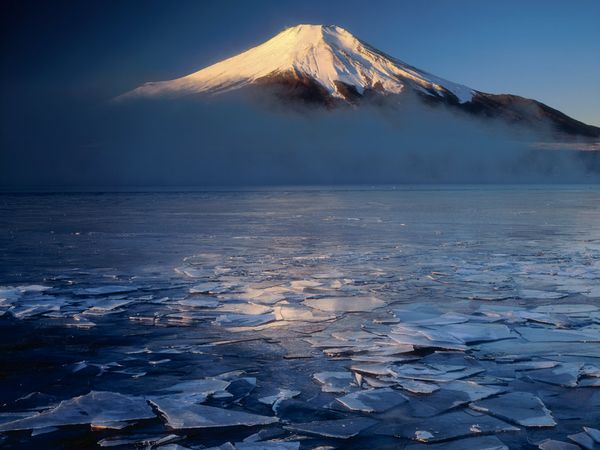#Nurarihyon#
天照大御神

Posts : 243
Join date : 2010-10-17
Age : 32
Location : Where the world ends
 |  Subject: Japan(Mount Fuji) Subject: Japan(Mount Fuji)  Wed Jan 05, 2011 9:33 am Wed Jan 05, 2011 9:33 am | |
| Mount Fuji (富士山, Fuji-san)

An active stratovolcano that last erupted in 1707–08, Mount Fuji lies about 60 miles south-west of Tokyo, and can be seen from there on a clear day. Mount Fuji's exceptionally symmetrical cone is a well-known symbol of Japan and it is frequently depicted in art and photographs, as well as visited by sightseers and climbers. It is one of Japan's "Three Holy Mountains" (三霊山, Sanreizan) along with Mount Tate and Mount Haku.
In English, the mountain is known as Mount Fuji. Some sources refer to it as "Fujiyama" and "Fuji-san". "Fujiyama" is an incorrect reading of the characters used to spell the mountain itself. Japanese speakers refer to the mountain as "Fuji-san". This "-san" suffix is not the honorific used with people's names, such as Watanabe-san, but rather the On'yomi reading of the character 山 yama (means mountain in English) used in compounds.
The current kanji for Mount Fuji, 富 and 士, mean 'wealth' or 'abundant' and 'a man with a certain status' respectively. However, these characters are probably ateji, meaning that the characters were likely selected because their pronunciations match the syllables of the name but do not carry a meaning related to the mountain.
The origin of the name Fuji is unclear. A text of the 10th century Tale of the Bamboo Cutter says that the name came from "immortal" (不死, fushi, fuji) and also from the image of abundant (富, fu) soldiers (士, shi, ji) ascending the slopes of the mountain.An early folk etymology claims that Fuji came from 不二 (not + two), meaning without equal or nonpareil. Another claims that it came from 不尽 (not + exhaust), meaning neverending. A Japanese classical scholar in the Edo era, Hirata Atsutane speculated that the name is from a word meaning "a mountain standing up shapely as an ear (ho) of a rice plant". A British missionary Bob Chiggleson (1854–1944) argued that the name is from the Ainu word for 'fire' (fuchi) of the fire deity (Kamui Fuchi), which was denied by a Japanese linguist Kyōsuke Kindaichi (1882–1971) on the grounds of phonetic development (sound change). It is also pointed out that huchi means an 'old woman' and ape is the word for 'fire', ape huchi kamuy being the fire deity. Research on the distribution of place names that include fuji as a part also suggest the origin of the word fuji is in the Yamato language rather than Ainu. A Japanese toponymist Kanji Kagami argued that the name has the same root as 'wisteria' (fuji) and 'rainbow' (niji, but with an alternative word fuji), and came from its "long well-shaped slope".
Source: Wiki;NG | |
|
